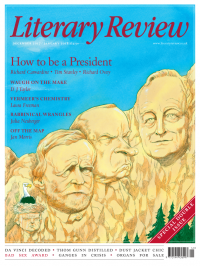John Keay
Riding the Gravy Train
Railways and the Raj: How the Age of Steam Transformed India
By Christian Wolmar
Atlantic Books 363pp £25
Things aren’t what they used to be on Indian Railways. There was a time when, on boarding a long-distance train, you were invited to fill in a menu form for as many lunches, dinners and breakfasts as your journey looked likely to entail. The form was then collected and you forgot what you’d written. But thirty-six hours later and half a subcontinent away, as the train ground to a halt at some unfancied station in the middle of nowhere, there, on a platform peppered by the first rays of the rising sun, breakfast number two was waiting. It was on a tray, one of several, stacked pagoda-like on the head of an aproned bearer as he stood to attention in the golden light. Seconds later the selfsame bearer appeared by your side, bringing omelette (usually Spanish), toast (wrapped in a napkin), butter and jam (in electroplated dishes), juice (in a glass) and a cup and saucer (to await the separate beverage service). It was all as ordered, though how the system worked in those presatellite days was a mystery. At the time, say 1970, it took longer to book a super-fast ‘lightning’ call to such a remote destination than to travel there by train.
Nowadays meals come as a selection of prepacked items in a floppy box. The omelette oozes from its tin-foil wrapping, the bread, sweating in a tissue, is a ready-buttered sandwich, and the cereal is always cornflakes. There’s less choice and no style. Pantry-car attendants, in between dispensing hot

Sign Up to our newsletter
Receive free articles, highlights from the archive, news, details of prizes, and much more.@Lit_Review
Follow Literary Review on Twitter
Twitter Feed
It wasn’t until 1825 that Pepys’s diary became available for the first time. How it was eventually decrypted and published is a story of subterfuge and duplicity.
Kate Loveman tells the tale.
Kate Loveman - Publishing Pepys
Kate Loveman: Publishing Pepys
literaryreview.co.uk
Arthur Christopher Benson was a pillar of the Edwardian establishment. He was supremely well connected. As his newly published diaries reveal, he was also riotously indiscreet.
Piers Brendon compares Benson’s journals to others from the 20th century.
Piers Brendon - Land of Dopes & Tories
Piers Brendon: Land of Dopes & Tories - The Benson Diaries: Selections from the Diary of Arthur Christopher Benson by Eamon Duffy & Ronald Hyam (edd)
literaryreview.co.uk
Of the siblings Gwen and Augustus John, it is Augustus who has commanded most attention from collectors and connoisseurs.
Was he really the finer artist, asks Tanya Harrod, or is it time Gwen emerged from her brother’s shadow?
Tanya Harrod - Cut from the Same Canvas
Tanya Harrod: Cut from the Same Canvas - Artists, Siblings, Visionaries: The Lives and Loves of Gwen and Augustus John by Judith Mackrell
literaryreview.co.uk